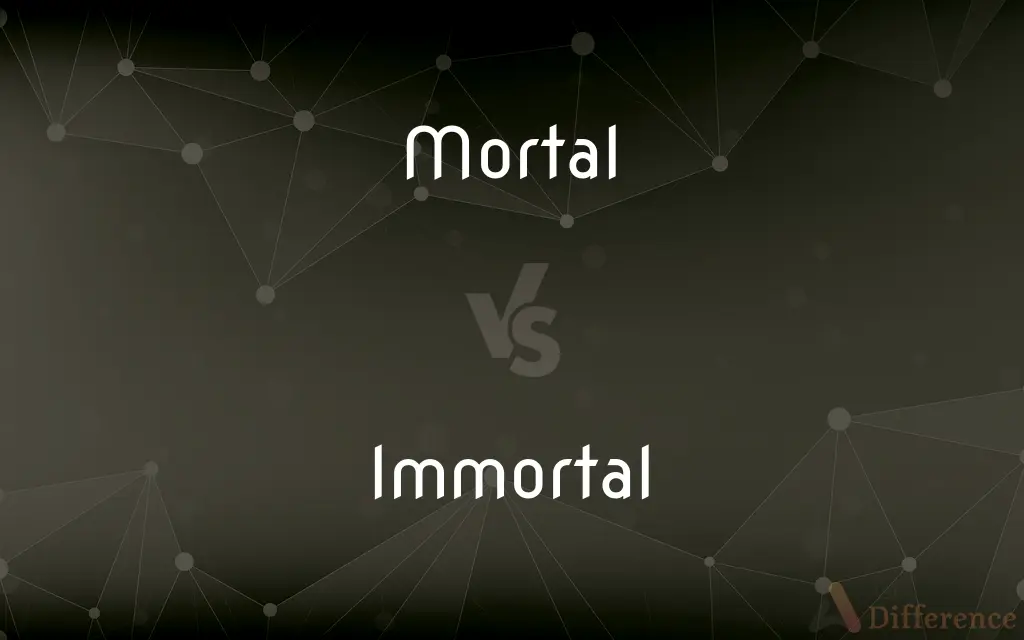Mortal vs. Immortal — What's the Difference?
By Urooj Arif & Maham Liaqat — Updated on March 18, 2024
"Mortal" refers to beings subject to death or decay, emphasizing the finite nature of life, while "immortal" denotes entities that do not age or die, highlighting perpetuity or eternal existence.

Difference Between Mortal and Immortal
Table of Contents
ADVERTISEMENT
Key Differences
Mortal beings, including humans and many other life forms, experience birth, growth, decay, and ultimately death. This finite lifespan shapes much of the human experience, influencing cultures, philosophies, and personal values, as the awareness of mortality impacts decision-making, relationships, and priorities. Immortal entities, by contrast, are conceptualized as not subject to the limitations of time and physical decay. Immortality can pertain to gods, spirits, or mythical beings in various cultural, religious, and philosophical contexts, representing ideals of eternal life, enduring legacy, or unending existence.
The concept of mortality is central to the human condition, fostering a sense of urgency and significance in life's endeavors. It underpins many philosophical and ethical frameworks, where the finiteness of life is seen as a catalyst for meaning, moral action, and the cherishing of temporal experiences. Immortality, meanwhile, often symbolizes the transcendence of physical limits and the human yearning for continuation beyond death. It can also reflect desires for perpetual youth, wisdom, or influence, manifesting in stories of deities, afterlives, and legendary heroes.
In literature and mythology, mortals are often portrayed as heroes or protagonists who achieve greatness despite their inherent vulnerability and eventual demise. Their stories may emphasize bravery, love, sacrifice, or the quest for significance within the bounds of a finite existence. Immortals, on the other hand, might serve as deities, guides, antagonists, or sources of wisdom, their eternal nature offering a stark contrast to human transience and serving as a narrative device to explore themes of envy, isolation, or the burdens of everlasting life.
The mortality of individuals and civilizations alike leads to profound cultural practices around death, remembrance, and legacy, from funerary rites to monuments and literature. These practices and creations seek to defy or negotiate with the inevitability of death, aspiring to achieve a form of immortality through memory, impact, or artistic expression. The concept of immortality, whether through belief in an afterlife, the enduring influence of one's deeds, or the quest for literal unending life, reflects diverse human attempts to grapple with or transcend the reality of mortality.
In summary, the mortal and immortal dichotomy embodies the tension between life's temporal nature and the human aspiration for permanence or continuity beyond physical existence. This contrast underpins a wide array of cultural narratives, philosophical inquiries, and personal reflections, shaping humanity's understanding of life, death, and the possibility of something beyond.
ADVERTISEMENT
Comparison Chart
Definition
Subject to death and decay.
Not subject to aging or death.
Significance
Emphasizes the finite nature of life and its phases.
Highlights concepts of eternity and perpetual existence.
Representation
Often portrayed as heroes or central figures in narratives.
Depicted as gods, spirits, or eternal beings.
Cultural Impact
Influences funerary rites, legacies, and the value placed on life.
Inspires stories of eternal youth, wisdom, and the afterlife.
Philosophical Implications
Underpins discussions on the meaning of life and ethical action.
Explores themes of transcendence, legacy, and the human condition.
Compare with Definitions
Mortal
Capable of dying; having a finite existence.
As mortal beings, humans have always been fascinated by the concept of eternity.
Immortal
Beyond the reach of time's decay or the physical limitations of life.
The search for an immortal elixir has been a perennial human quest.
Mortal
Reflecting the temporal nature of existence.
Mortal endeavors, however grand, are ultimately bounded by time.
Immortal
Not subject to death; living forever.
The ancient gods were often considered immortal, living beyond the span of human lifetimes.
Mortal
Used to describe creatures or entities that are not divine or eternal.
In many myths, mortals interact with gods, highlighting the contrast between the two.
Immortal
Pertaining to eternal existence or undying nature.
The concept of an immortal soul is central to many religious beliefs.
Mortal
Subject to the limitations and vulnerabilities of life.
Despite his fame, he remained aware of his own mortal frailties.
Immortal
Symbolizing unending existence or influence.
The immortal words of the poet continue to inspire generations.
Mortal
Pertaining to human life or the human condition.
The poet mused on the mortal joys and sorrows that bind humanity.
Immortal
Used to describe ideas, works, or legacies that endure beyond a lifetime.
Her contributions to science have made her memory immortal.
Mortal
Liable or subject to death; not immortal
Mortal beings.
Immortal
Not subject to death
Immortal deities.
The immortal soul.
Mortal
Of or relating to humans as being subject to death
"When we have shuffled off this mortal coil" (Shakespeare).
Immortal
Never to be forgotten; everlasting
Immortal words.
Mortal
Causing death; fatal
A mortal wound.
Immortal
Of or relating to immortality.
Mortal
Fought to the death
Mortal combat.
Immortal
(Biology) Capable of indefinite growth or division. Used of cells in culture.
Mortal
Relentlessly hostile; implacable
A mortal enemy.
Immortal
One not subject to death.
Mortal
Of great intensity or severity; dire
Mortal terror.
Immortal
One whose fame is enduring.
Mortal
Conceivable; imaginable
No mortal reason for us to go.
Immortal
Not susceptible to death; living forever; never dying. Category:en:Immortality
Mortal
Used as an intensive
A mortal fool.
Immortal
Never to be forgotten; that merits being always remembered.
His immortal words
Mortal
A human.
Immortal
Connected with or relating to immortality.
Mortal
Susceptible to death by aging, sickness, injury, or wound; not immortal.
Immortal
(obsolete) Exceedingly great; excessive; grievous.
Mortal
By death.
Immortal
One who is not susceptible to death.
Mortal
Vulnerable.
Immortal
A member of an elite regiment of the Persian army.
Mortal
Of or relating to the time of death.
Immortal
A member of the Académie française.
Mortal
; belonging or pertaining to people who are mortal.
Mortal wit or knowledge; mortal power
Immortal
(Internet) An administrator of a multi-user dungeon.
Mortal
Very painful or tedious; wearisome.
A sermon lasting two mortal hours
Immortal
Not mortal; exempt from liability to die; undying; imperishable; lasting forever; having unlimited, or eternal, existance.
Unto the King eternal, immortal, invisible.
For my soul, what can it do to that,Being a thing immortal as itself?
Mortal
Very drunk.
Immortal
Connected with, or pertaining to immortality.
I have immortal longings in me.
Mortal
(religion) Of a sin: involving the penalty of spiritual death, rather than merely venial.
Immortal
Destined to live in all ages of this world; abiding; exempt from oblivion; imperishable; as, immortal fame.
One of the few, immortal names,That were not born to die.
Mortal
A human; someone susceptible to death.
Her wisdom was beyond that of a mere mortal.
Immortal
Great; excessive; grievous.
Mortal
(colloquial) Mortally; enough to cause death.
It's mortal cold out there.
Immortal
One who will never cease to be; one exempt from death, decay, or annihilation.
Mortal
Subject to death; destined to die; as, man is mortal.
Immortal
A person (such as an author) of enduring fame;
Shakespeare is one of the immortals
Mortal
Destructive to life; causing or occasioning death; terminating life; exposing to or deserving death; deadly; as, a mortal wound; a mortal sin.
Immortal
Any supernatural being worshipped as controlling some part of the world or some aspect of life or who is the personification of a force
Mortal
Fatally vulnerable; vital.
Last of all, against himself he turns his sword, but missing the mortal place, with his poniard finishes the work.
Immortal
Not subject to death
Mortal
Of or pertaining to the time of death.
Safe in the hand of one disposing Power,Or in the natal or the mortal hour.
Mortal
Human; belonging to man, who is mortal; as, mortal wit or knowledge; mortal power.
The voice of GodTo mortal ear is dreadful.
Mortal
Very painful or tedious; wearisome; as, a sermon lasting two mortal hours.
Mortal
A being subject to death; a human being; man.
Mortal
A human being;
There was too much for one person to do
Mortal
Subject to death;
Mortal beings
Mortal
Involving loss of divine grace or spiritual death;
The seven deadly sins
Mortal
Unrelenting and deadly;
Mortal enemy
Mortal
Causing or capable of causing death;
A fatal accident
A deadly enemy
Mortal combat
A mortal illness
Common Curiosities
What role does mortality play in shaping human societies?
Mortality shapes human societies by influencing cultural practices, ethical systems, and personal priorities, driving the creation of art, the pursuit of legacy, and the development of social bonds.
How do different cultures perceive the concept of immortality?
Perceptions of immortality vary widely among cultures, with some viewing it as a blissful eternal existence and others as a state to be achieved through spiritual enlightenment or moral living.
Can ideas or creations be considered immortal?
Ideas, art, or creations can be considered immortal in the sense that they continue to influence or resonate with people long after their creators have passed away, achieving a form of enduring legacy.
Can mortals become immortal in myths or stories?
In myths and stories, mortals can sometimes achieve immortality through various means, such as divine favor, magical objects, or heroic deeds that grant them a place among the stars or gods.
Is immortality always desirable in philosophical or cultural narratives?
While immortality is often portrayed as desirable, many narratives also explore its potential downsides, such as endless solitude, boredom, or witnessing the continual loss of loved ones.
How do immortal beings interact with mortals in mythology?
In mythology, immortal beings often interact with mortals as mentors, adversaries, or benefactors, their interactions serving to highlight themes of fate, hubris, or the quest for wisdom.
Are there scientific pursuits aimed at achieving immortality?
Scientific pursuits such as life extension, cryonics, and digital consciousness aim at prolonging life or achieving a form of immortality, reflecting ongoing human fascination with transcending mortality.
How do religions typically address the concepts of mortal and immortal?
Religions often address these concepts through teachings on the afterlife, the soul's eternal nature, or pathways to transcendence, offering various perspectives on mortality and the possibility of immortality.
What psychological effects does the awareness of mortality have on individuals?
Awareness of mortality can lead to existential reflection, prioritization of meaningful experiences, and heightened appreciation for life, but it can also evoke fear, anxiety, or a sense of urgency.
In what ways do people seek to achieve a form of immortality?
People seek to achieve a form of immortality through their offspring, contributions to society, creative works, or by leaving a lasting impact that continues to influence others beyond their lifetime.
Share Your Discovery

Previous Comparison
Waisted vs. Wasted
Next Comparison
Morale vs. MoralityAuthor Spotlight
Written by
Urooj ArifUrooj is a skilled content writer at Ask Difference, known for her exceptional ability to simplify complex topics into engaging and informative content. With a passion for research and a flair for clear, concise writing, she consistently delivers articles that resonate with our diverse audience.
Co-written by
Maham Liaqat












































